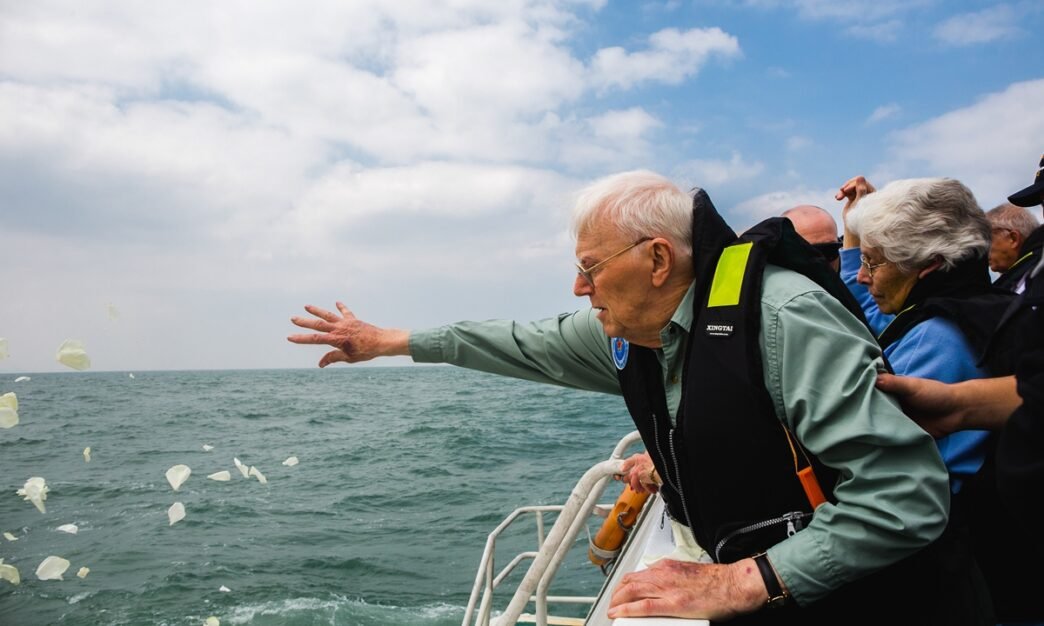A relative of British POWs pays tribute at the site where the Lisbon Maru sank in 1942, in October 2019. Photo: Courtesy of the production team
Since the highly anticipated document The Sinking of The Lisbon Maru premiered across China in September, more details about this historic event interwoven with the cruelty of war and humanitarian care have surfaced, brought to light by peace-loving individuals. In a recent interview with the Global Times, a Japanese scholar on the research of prisoners of war (POWs) shared her eagerness to learn the testimonies of the Chinese fishermen who rescued the British POWs from the sunken World War II ship The Lisbon Maru and reveal more historical truth to contribute to the creation of genuine world peace.
It is very important to uncover and piece together the historical truth for the understanding of the historic event by everyone, and only by such a down-to-earth method can nurture a mindset avoiding wars and thereby build the real peace, said Taeko Sasamoto, co-founder of POW Research Network Japan, a civil society group consisting of professional and non-professional researchers as well as concerned citizens investigating the subject of allied POWs in Japan.
Sasamoto recalled that she was profoundly moved when she learned about the sunken ship and how the Chinese fishermen near the Zhoushan Archipelago in East China’s Zhejiang Province bravely rescued the British POWs.
“As far as I know, the POWs who were rescued and their families have continued to express their gratitude to the Chinese fishermen to this day,” Sasamoto told the Global Times.
The Lisbon Maru was an armed Japanese cargo ship that was active during World War II. On October 1, 1942, while transporting over 1,800 British POWs from Hong Kong to Japan, it was struck by the torpedo of a US submarine. To prevent the prisoners from escaping, the Japanese soldiers had cruelly locked the POWs below deck, resulting in the drowning of 843 British POWs. However, 384 British POWs were heroically rescued by local fishermen from Zhoushan, who risked their lives to save them.
With the success of the historical document The Sinking of The Lisbon Maru, more people have come to know about this historical event previously unfamiliar to the public.
According to Sasamoto, she came across an article introducing a cemetery for the deceased people of Commonwealth nations as early as the 1990s. Although the cemetery was near her home, she had previously known nothing about it, which made her question why there were so many foreign POWs buried in Japan. Since the establishment of the POW Research Network Japan in 2002, Sasamoto and the other members of the civil society group have been attempting to find out the historic truth of POWs.
During the process, Sasamoto detailed the history of the sunken World War II ship, in her works and articles. According to Sasamoto, after the British POWs were transported to Japan, they were held in POW camps in cities such as Osaka and Kobe. Sasamoto also offered help when Hong Kong-based Phoenix TV went to Japan to film a program related to the Lisbon Maru.
However, over time, many of the parties involved and individuals familiar with the incident have passed away, making the research increasingly difficult. After the war, documents related to the POWs were immediately destroyed by the Japanese milit, forcing researchers to rely on historical materials preserved in foreign archives, such as those in the UK and the US, as well as communication with the former POWs and their families, to conduct their researches, according to Sasamoto.
During her research, Sasamoto referred to the testimonies of Shigeru Kyoda, the Lisbon Maru’s captain. She believes it is essential to examine an event from multiple perspectives when uncovering the truth. Therefore, she hopes to learn about the testimonies of the Chinese fishermen who rescued the POWs, alongside the accounts of British POWs and Japanese individuals.
Sasamoto also stressed the significance of peace, noting that the wars have claimed innumerable lives and caused many individuals to endure tragic life experiences, and whenever a war breaks out, various people are caught in a vortex of displacement, suffering immeasurable harms. Yet, even so, wars still break out repeatedly till this day, which she felt deeply regrettable.













